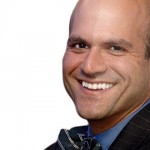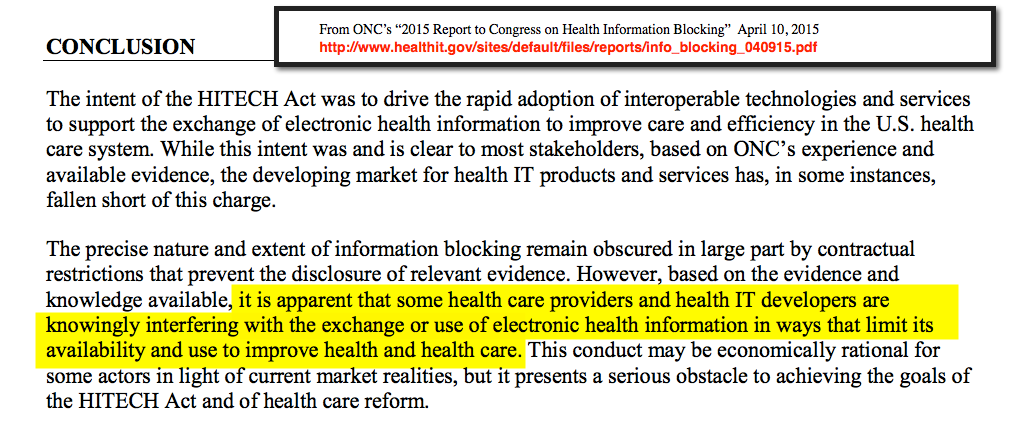Friday evening I got a tweet from SPM member Sherry Reynolds about something that had just happened in Washington. Today it unfolded. (Don’t miss her comment, too, about the history of this issue and her role in it.)
Change can provoke upset. Technological change can be hard, especially in an industry that’s not known for its IT leadership. And social change can be upsetting to the point of the establishment fighting back … as people in the civil rights movement learned. (The recent movie “Selma” makes all this fresh in many people’s minds.)
To some observers of health IT, it appears the establishment is indeed fighting back – actively, through its lobbyists – to reverse the progress patient activists have made. And it looks like things are coming to a head, right now, at the huge HIMSS health IT conference just starting in Chicago.
First, watch this two minute hallway video of SPM member Regina Holliday Sunday night, responding to that Friday news item.
The “day of action” she’s talking about was proposed in a speech a few hours earlier by Dr. Farzad Mostashari, former National Coordinator for health IT, who worked for years to give patients and families the data they need to manage their families’ care. He is not happy with that Friday news item – a rule change proposed by CMS, the agency that makes the rules about what providers need to do, to get full payment. After all the work we’ve done, CMS has basically said “Meh – okay, you can get full payment without anyone actually getting their data.”
(Technically, they propose changing the rule from “5% of patients must view or download or transmit” to “only one patient” (not 1%, one patient) must do it. So, as one IT executive said today in a side conversation, “They get their Chief Nursing Officer to look at her record, and they’re good.”)
Farzad’s remarks came in the closing keynote in today’s “patient engagement symposium.” Reporters in the room were typing furiously. Within two hours health IT journalist Neil Versel had posted about Farzad’s talk and his call to action:
Mostashari wants ‘day of action’ for widespread patient access to records
I’m sure much more will be written – keep an eye out.
For health data activists this was a particularly bitter blow to the heart, coming as it does on the heels of a different announcement last week: in a 39 page report requested by Congress, ONC (the agency Farzad used to head) reported that some health care providers and system vendors are knowingly interfering with efforts to move our data around. Here’s a screen capture from that report:
SPM board member Jane Sarasohn-Kahn of the Health Populi blog said on Facebook, “We can make this a movement – we’re waiting to hear about a date-certain, which I will certainly promulgate on every social network I’m on – and I will as you to do the same.”
Separately, on the Healthcare Informatics blog Sunday night, journalist Gabe Perna wrote
I can’t help now but feel as if dropping it to one person is ridiculous. … It’s quite frankly, an insulting blow to patient engagement efforts everywhere, and all that it represents in the shift towards the new healthcare. …
[Farzad] called for a day where one million patients asked for their health records as a show that this measure shouldn’t be gutted. If that day comes, I’ll definitely be one of the million.
Gabe also noted that the proposed change was buried in a big set of changes that were released just before closing time last Friday.
Is the empire striking back?
Wow: “knowingly interfering … in ways that limit [information’s] availability,” “ridiculous,” “insulting blow.”
Amazed by both the CMS and ONC announcements (which I hadn’t seen until today), I asked someone in Sunday’s patient engagement session, “Is this The Empire Strikes Back??” He said “If it is, we need the ‘Return of the Jedi.'” That’s what Farzad’s call to action and Regina’s impromptu talk look like.
Stay tuned.
p.s. Note that this is what it looks like when patients are present at a healthcare conference.








MY HISTORY of Patients in Health IT – this rule change feels like almost like the loss of a child to me.
In 2007 some ONC staffers invited me, Deven McGraw and a few others to help embedded patient voices first at the National eHealth Collaborative where I served on the Governance committee and then via their board selection committee.
When HITECH passed (2 billion for ONC via appropriations and 28+ billion for CMS via authorization) most of the board (including Deven) moved over to serve on the Policy and Standards committees and again we made sure consumer committees were created so patient voices were at the table from the beginning.
Rob Kolodner, MaryJo Deering and I then created the first consumer position at ONC (but it wasn’t funded when Rob left and remained an idea till Farzad was made the director) All of us worked hard to bring patient voices to the policy makers and were relieved when Dave and Regina with their powerful stories arrived to back us up.
In 2013 I could see the shift to putting patients on the care team wasn’t moving fast enough so I quit my job and went to work for ONC where I was “responsible” for Provider Adoption of Patient Health IT. HITECH however only funded the Regional Extension Centers [which trained docs in health IT] for Stage 1 so we were limited in what we could do and none of us ever really focused on CMS.
ONC is responsible for advising HHS on Health IT policy but the actual rules are created by the much larger CMS (which gives out the $$$ to doctors and providers) for using health IT and when they post a new rule they look very closely at the comments and who sends them in and large well funded lobbying groups tend to dominate.
How else can you explain, when the latest HARRIS poll shows 86% of patients have a portal, that they want to roll it back to 1 patient per provider? The rule itself is less of a concern – it is the lack of understanding at CMS that patients are not just passive recipients of data but full members of their care teams and deserve the same access to data as the docs, nurses, lab techs, MA, billing clerks.
Dave and my own mom (10 year survivor metastatic breast cancer) are both still alive because they had access to high quality care AND the information they needed to make informed decisions. Everyone’s family members deserve that same right, not just those of us lucky enough to understand technology and how to negotiate the health care system.
You can’t be begging for scraps of data from the table or even be thankful to be “at the table” – you need to design the menu, shop for the food, and build the table and the meal, with those in power to bring about change in DC.
Equal access to information about our own health is a fundamental right.
Total coincidence but I finally posted my sons data access experience which is way trivial compared to may here, but indicates the problems…and has pictures!
http://thehealthcareblog.com/blog/2015/04/12/in-search-of-intra-aero-bili-ty/
Susannah Fox points us to a piece last month on NPR’s Marketplace about data sharing. Quotes:
And
and
Now go re-read that clip above from ONC’s report to Congress last week. Hm.
Hi question,
Is this change the totality of what’s being proposed?
I’m asking because, I’ve never liked the 5% rule because in and of itself it doesn’t drive engagement behavior. Instead, waaay back when, when I was asked about it, I suggested something more useful, like % timely response to messages, because regardless of the number of people using a portal, if it takes 3 days for a message to be responded to, that’s not a portal being used with intent.
Which brings me back to this – I wouldn’t put the 5% rule on a pedestal, unless that’s the only change being made, ie is there any evidence of intent to reduce access overall, or is this part of a more streamlined package of changes?
The other observation that should be made is that in 2015, it’s much harder to find an EHR install without a portal, at some point the genie is out of the bottle, and with organizations (like Kaiser Permanente, for example :)) having over 5,000,000 actively using theirs, there is no going back.
Thanks for the perspective, let me know if I can be of service, (as always)
Ted
(Copied from Facebook, as Dave requested).
Well, this is her core personal issue, isn’t it? And she is dead right. Activism of this sort may be the stimulus to greater recognition of the movement, around an issue that everyone can understand.
But I have another comment – it is CRITICAL that the intent of this day be laser focused to the public, with a clear and simple message. Now is your chance to really get some press. Please resolve all internal issues such as raised by Peter and Ted ASAP so you have a consensus.
Health IT journalist Dan Munro, who very much gets this due to his own family’s challenges, just posted “The Kabuki Dance of ‘Blocking Data’ in Healthcare.”.
If you don’t know, here’s what Kabuki dance is, in American politics. Political posturing.
Oh good heavens…What a freakin’ disaster. Please let me know how we can contribute any Jedi strength on behalf of pediatric patients and families. It’s notable that patients can get their data more readily in China than in many spots in the U.S….perhaps not electronically, but still. Let it be known that this sort of interoperability sabotage poses a clear and present danger, particularly to pediatric patients and families who already struggle to access and share vital and timely health information with a clinicians across institutional and geographic borders.